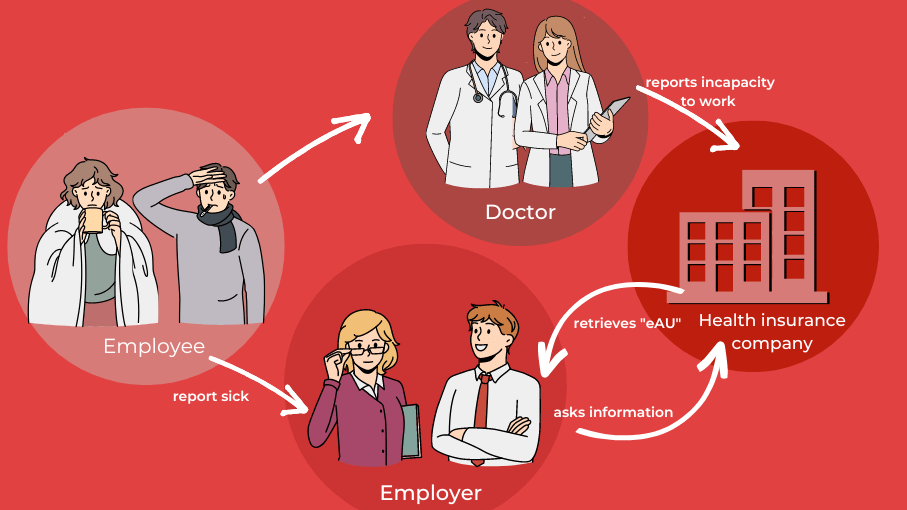Electronic certificate of incapacity for work (eAU)
From January 2023, the paper certificate of incapacity for work will essentially be abolished and replaced by an electronic procedure. Employees will no longer have to present a yellow slip of paper – instead, employers will be required to proactively retrieve this data from the relevant health insurance fund. In the future, if a doctor determines that an employee is unable to work, he or she must transmit the necessary data, which was previously found on the certificate of incapacity for work, to the relevant health insurance fund first.

What obligations will employees (still) have in the future?
Up to now, employees have been obliged under Section 5 (1) of the EFZG to immediately report any incapacity to work due to illness and its expected duration. This obligation continues to exist (!). Violations can lead to a warning and further consequences under labor law.
On the other hand, Section 5 (1) Sentence 2 EFZG stipulates: In the event of an illness lasting longer than three days, employees must submit a medical certificate of incapacity for work and its duration no later than the fourth day. Employers may also require the submission of a medical certificate earlier.
This obligation is now supplemented by a newly inserted Section 5 (1a) EFZG and various social insurance regulations. According to this, employees are in principle only obliged to have the incapacity for work and its expected duration determined by a doctor “and to have a medical certificate (…) handed over”. Employers can therefore continue to demand this – probably even on the first day. Only the transfer of the information to the employer is no longer the responsibility of the employee, but the employer calls it up from the health insurance company.
Violations of the new obligations under Section 5 (1a) EFZG can be answered by the employer with a warning or other disciplinary measures. Not expressly included in the new regulation is the right of the employer to stop wage payments due to such a breach of duty.
Are all employees affected by the new regulations?
No. The new regulations on the electronic transmission of incapacity to work data only apply if
- an employee is insured with a statutory health insurance fund,
- the incapacity to work is diagnosed by a physician who participates in the statutory health insurance scheme, and
- the employee does not wish to claim continued payment of remuneration in the context of marginal employment in a private household.
For all other cases, however, the previous legal situation remains in place, i.e. the obligation to submit a paper certificate of incapacity to work in accordance with Section 5 (1) sentences 2 to 5 EFZG.
What do employers have to do to adapt to the new regulations?
At the turn of the year, employers should ensure that their personnel / HR or payroll departments are informed about the new regulation and that the technical requirements for retrieving health data via the health insurance companies are in place. Data protection and works council’s co-determination regulations must also be observed here. Employees should also be informed in good time to prevent misunderstandings.
Finally, employment contract templates should also be adapted to the new regulations for the future. We will be happy to send you a suitable formulation.



